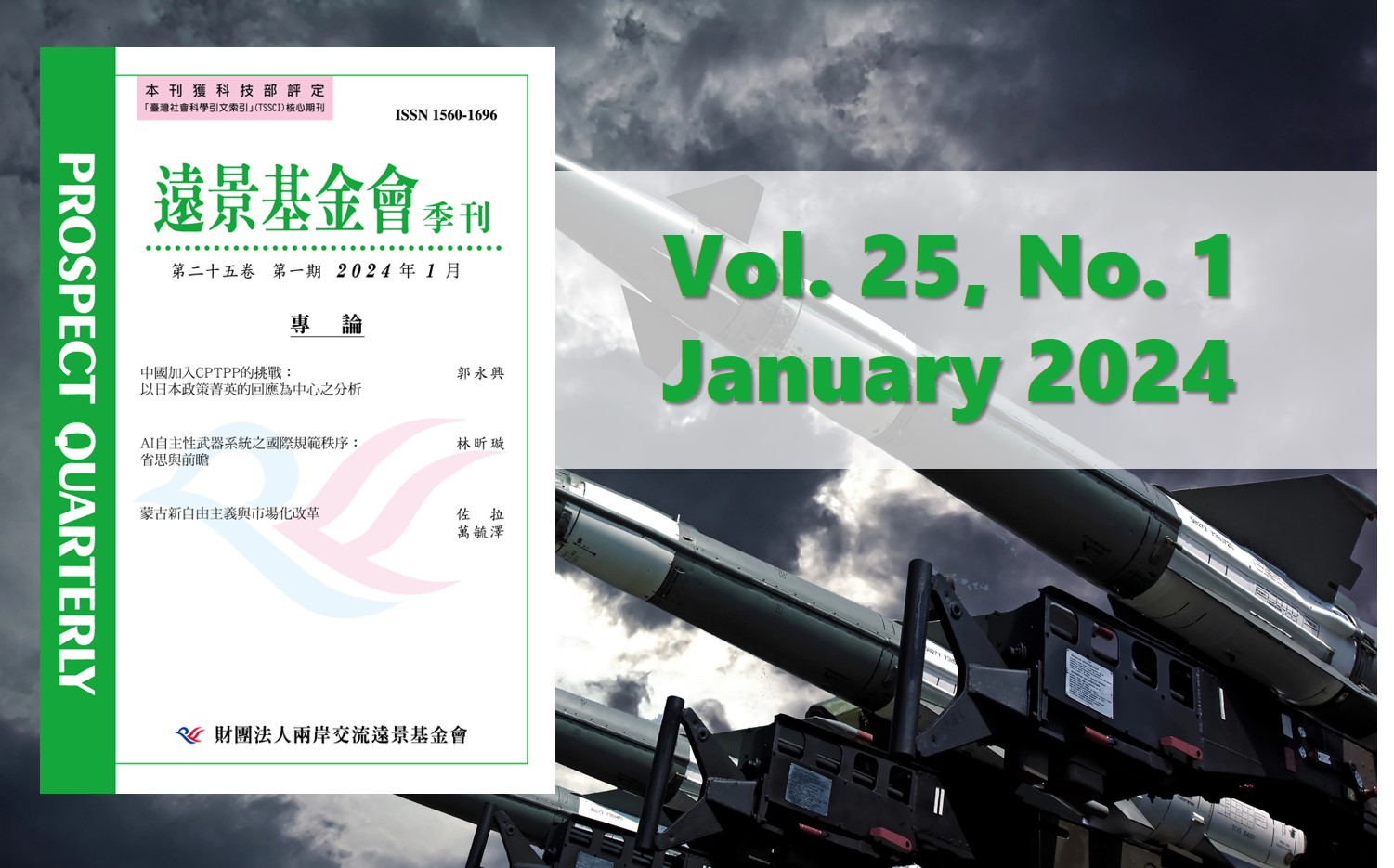Prospect Quarterly 25-1
China’s Challenges in Joining the CPTPP: An Analysis on Japanese Elites’ Response
Yung-hsing Guo
(Professor, Department of International Business,
National Taichung University of Science and Technology)
Abstract
As the largest economy in the CPTPP, Japan will play a decisive role over China’s bid to join the regional trade group. Literature demonstrates that Japan’s diplomatic policy related to China has shifted from being led by bureaucrats to a strong role by the Liberal Democratic Party (LDP) since the 1990s. By searching secondary data, this paper argues that although the LDP has stressed the high standards of the CPTPP and implied difficulties in addressing the significant gap between CPTPP standards and China’s existing economic system, research from the Ministry of Economy, Trade and Industry think tank reveals that except for the issue of labor right, the gap in state-owned enterprise and E-Commerce could be addressed through political negotiations. However, most Japanese experts do not support China’s bid, with the main concerns being Japan-United States relations and Japanese leadership in the CPTPP. The author of this paper interviewed bureaucrats from the Ministry of Foreign Affairs and scholars closed to Ministry of Foreign Affairs and the Ministry of Economy, Trade and Industry in the summer of 2022 and confirmed that the Japanese bureaucracy has blocked China’s access to negotiations related to the CPTPP. The no-contact strategy of the Japanese bureaucracy is influenced by LDP Diet members and is consistent with a strong LDP as argued in the literature.
Keywords: Sino-Japanese Relations, Japan-United States Relations, Ministry of Foreign Affairs of Japan, Liberal Democratic Party, CPTPP
International Norms and Regulations for AI Autonomous Weapons Systems:
Reflections and Prospects
Hsin-hsuan Lin
(Assistant Professor, Department of Political Science,
National Cheng Kung University)
Abstract
With the rise of big data-based predictive algorithms, controversies have arisen over the development of AI autonomous weapons systems, which have emerged as a new focal point in the study of international law. This paper examines how these new systems are and ought to be applicable to the international legal order on the basis of international humanitarian law as well as other relevant laws. Focusing on the texts of international law, this paper compares how autonomous weapons system is defined by the U.S. Department of Defense, China, Germany, International Committee of the Red Cross and Human Rights Watch according to the degree of autonomy and intellectual decision- making loop. This paper then unpacks the process of negotiations and milestones of the Convention on Certain Conventional Weapons. It demonstrates that several proposals put forth by the contracting parties to the Convention have reached an impasse in negotiations, making it difficult to adequately address the potential risks posed by autonomous weapons systems. Consequently, this paper proposes several regulatory insights regarding the control over military algorithms by implementing meaningful human control and accountability mechanisms.
Keywords: Autonomous Weapons Systems, AI, Convention on Certain Conventional Weapons, Additional Protocol I to the Geneva Conventions, Inspection of Weapon-related Algorithms
Neoliberalism and Market Reforms in Mongolia
Zugeerbai Zul
(Ph.D. Candidate, Graduate Institute of National Development,
National Taiwan University)
Poe Yu-ze Wan
(Professor, Department of Sociology, National Sun Yat-sen University)
Abstract
Since 1991, the Mongolian government has initiated significant “free market” reforms, bringing neoliberalism to the forefront. Over the past three decades, the Mongolian government has followed the loan and aid policies of the International Monetary Fund (IMF). However, unresolved socio-economic challenges persist. This article explores the introduction and implementation of neoliberalism in Mongolia and utilize the “explicit” and “implicit” indicators proposed by Mongolian scholar Nergui to analyze and assess Mongolia’s market transformation and its effects. It demonstrates that Mongolia’s free-market monetary policies have had numerous negative effects, including widespread poverty, soaring unemployment rates, rampant crime and corruption, unbalanced economic development, and the emergence of oligarchic groups as power elites. The free-market system has become the foundation for these power elites to seize economic and political benefits. Furthermore, the large-scale privatization of state-owned assets has transferred mineral resources to multinational corporations, making it difficult for Mongolia to control its own economic lifelines.
Keywords: Mongolia, Neoliberalism, Market Reforms, International Monetary Fund, Nergui Pagma





